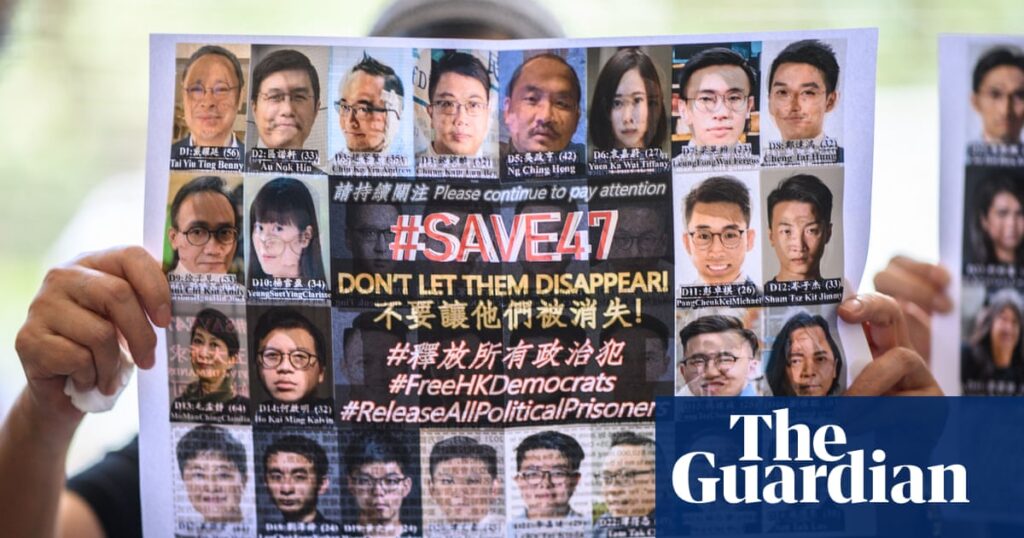Hong Kong’s largest national security trial will draw to a close on Tuesday, with dozens of the city’s most prominent democracy campaigners to be sentenced for subversion, a charge that can carry life imprisonment.
Beijing imposed a sweeping national security law on the financial hub in 2020, snuffing out months of massive pro-democracy protests.
Western countries and international rights groups have condemned the trial as evidence of Hong Kong’s increased authoritarianism.
The “Hong Kong 47” were arrested in 2021 after holding an unofficial election primary, which aimed to improve pro-democracy parties’ chances of winning a majority in the city’s legislature.
Two of the 47 were acquitted in May but on Tuesday the rest will find out their sentences, many after more than 1,300 days spent in jail.
The case is the largest by number of defendants since the law was passed in mid- 2020.
There is intense public interest in the trial in Hong Kong and the queue for members of the public to get inside the West Kowloon Magistrate’s Court started over the weekend and numbered more several hundred people by Tuesday.
On Tuesday morning, vanloads of police patrolled and cordoned the crowd into a line that stretched down the block and folded back on itself. Officers were seen searching several people.
Dennis, a former district councillor, lined up at 4am to support the convicted, many of them his friends. Dennis has been able to visit some of his friends in jail over the years.
“I think quite a number of them are quite depressed about their future. So I think I have to come and give a little support. I think most of them won’t be released and quite a number of them have to face quite a long detention.”
On Wednesday the jailed media tycoon and pro-democracy activist Jimmy Lai will also testify in his collusion trial, breaking the silence he has kept over five previous trials and almost four years in jail.
The charges against Lai – the founder of the now-shuttered popular Chinese-language tabloid Apple Daily – revolve around the newspaper’s publications, which supported the pro-democracy protests and criticised Beijing’s leadership.
China and Hong Kong say the security law restored order after the 2019 protests and have warned against “interference” from other countries.
Outside court, a queue for public seats to watch the sentencing has been growing since Saturday night, with many people refusing to speak to the media.
Ceci, a retiree who joined the queue on Sunday, has been following the case since the mass arrest on 6 January 2021.
“I just wish they can get a lighter sentence … no other hopes beyond that,” she said on Monday.
The aim of the election primary, which took place in July 2020, was to pick a cross-party shortlist of pro-democracy candidates to increase their electoral prospects.
If a majority was achieved, the plan was to force the government to meet the 2019 protesters’ demands – including universal suffrage – by threatening to indiscriminately veto the budget.
Three senior judges handpicked by the government to try security cases said the group would have caused a “constitutional crisis”.
The 47 made up a cross-section of Hong Kong’s once vibrant political opposition, including former lawmakers, unionists, lawyers, social workers and journalists.
The “principal offenders” face 10 years to life in jail.
Benny Tai – one of the city’s most renowned constitutional and human rights legal scholars – has been named “the brain behind the project” by prosecutors.
Others singled out as “more radical” are the former leaders of the now-disbanded Civic party, Alvin Yeung and Jeremy Tam, the young activist Owen Chow and the former journalist Gwyneth Ho.
The oldest defendant is “Long Hair” Leung Kwok-hung, the 68-year-old co-founder of the city’s last standing opposition party, the League of Social Democrats.
Emilia Wong, the girlfriend of the rally organiser Ventus Lau, said he had appeared more anxious in recent months.
They hadn’t discussed the potential sentence much because “it’s an unprecedented case”, she said.
“A long time ago, he said if the sentence is up to 10 years or 20 years, I should not wait for his release,” she said. “But I think we don’t have to decide now as life itself is fluid.
“The [sentencing] day may be a significant milestone for the outside world but for me … I will just have to carry on with my normal life, visiting him and handling his matters.”
With Agence France-Presse
